
Amid all the talk about “opening up the economy,” there’s one big question. How?
Imagine you’re the owner of a fitness club. The CoronaCrisis shutdown has nearly destroyed your business, with most of your customers canceling their gym memberships, but you’ve managed to stay afloat. Now you can finally, cautiously open up your club again.
How?
Do your customers wear masks on the StairMaster? Do you sanitize every weight machine after every customer uses it? Do you move all the treadmills six feet apart and hope no one coughs?
As the economy begins cautiously opening up, it’s strange to see pictures of customers in restaurants wearing masks. How do they eat?
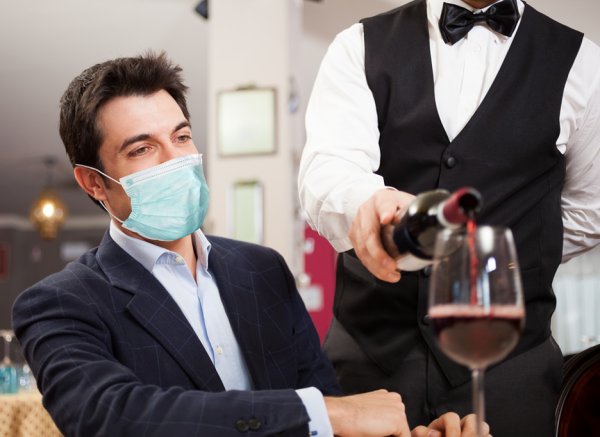
“Ah, yes. The Niner Estates 2018 Cabernet, with a hint of yesterday’s mask. Excellent choice.
We’ve talked about a #NewNormal, but there’s nothing normal about this. Wearing masks is just not part of the experience at Walt Disney World, or a beauty salon, or a football game. And leaving behind the science and the politics, some people are just not going to go outside without a mask.
There is high anxiety around COVID-19. Even with protection, people are afraid to leave the house. Even if they’re not afraid, they’re thinking twice.
Will some people come to your gym, or your beauty salon, or your football game? Yes.
Will some people feel safe enough to go without a mask? Yes.
But how many? That’s the $80 trillion question.
Will eighty percent of your gym members show up? Fifty percent? Twenty percent? The implied reasoning is that if some of your gym members show up, others will too. Then the virus magically goes away, and business bounces “back to normal.”
Hoping the virus magically goes away is not really a great plan for the future. Fortunately, blockchain provides a better solution. We’ll call it “FastYes.”
Introducing FastYes: A QR Code on Your Phone
Before you go in the fitness club, you scan a QR code on your phone, and the scanner turns green. You’re safe. Inside the gym, things really are “back to normal.” No masks. No weirdness. Unlike the days before Coronavirus, people are actually diligent about wiping down the equipment.
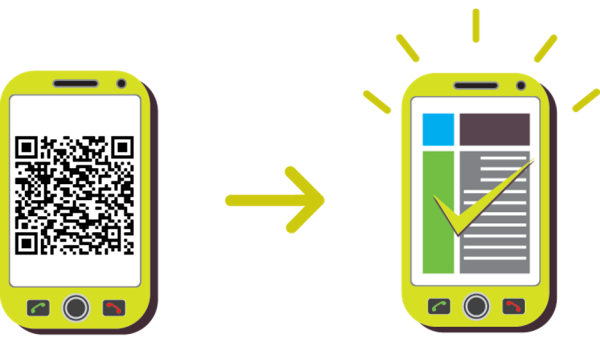
Behind the scenes, it’s a blockchain-based technology that is checking:
1) Safety: whether you have been tested
2) Privacy: without your personal information being revealed
This is important, especially in America, where safety and privacy are the two great concerns.

These two values – safety and privacy – must be kept in balance, and FastYes neatly solves for both. Here’s how it works.
- You get tested: You go to your doctor to get tested for Coronavirus.
- You receive a health file: Your doctor gives you a clean bill of health. Or more accurately, a clean file of health, since this information is stored in a digital file that you hold. (Think of this like a doctor handing you a photocopy of your immunization records.)
- We check that your file matches your doctor’s file: Imagine we now put your immunization record in a file folder, and confirm that it matches the file in your doctor’s folder.
- We store a record of this “match” on the blockchain. This is not your personal information, just a record that the two files match. (For blockchain geeks: we’re storing a hash of the record, not the record itself.)
- When you scan your QR code, it verifies the match: When you go into the store or restaurant, the FastYes app is just confirming that the two files match – without the file itself ever changing hands.
Another way to think of this: imagine that you hold a key, and your healthcare provider holds a key. Both keys have to fit the lock.

The FastYes record can be set to expire in a day, a week, or ten years. It can be issued by any qualified healthcare provider. And it’s totally free to use, anywhere in the world. (Though you will need programmers to help you set it up.)
This technology is ready to go. There are several tech companies that have a working solution in place today. For example, check out the open-source Blockcerts platform, which creates trusted blockchain-based “credentials” without compromising privacy.
Dwight Schrute Has Questions
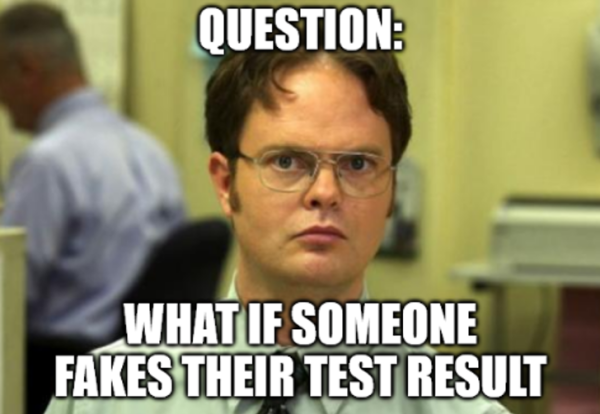
Your file won’t match your doctor’s file. That’s a FastNo.
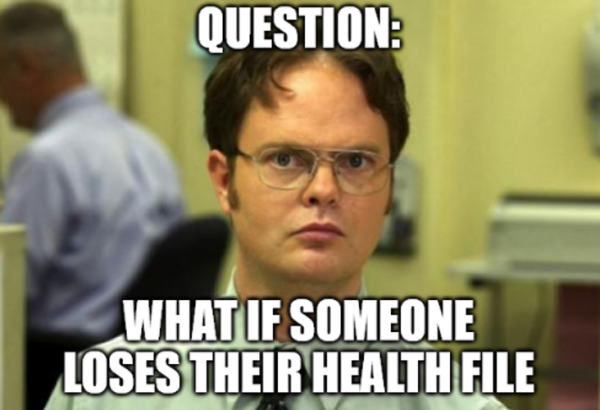
Your healthcare provider still has a copy on hand. (Just like your immunization records.)
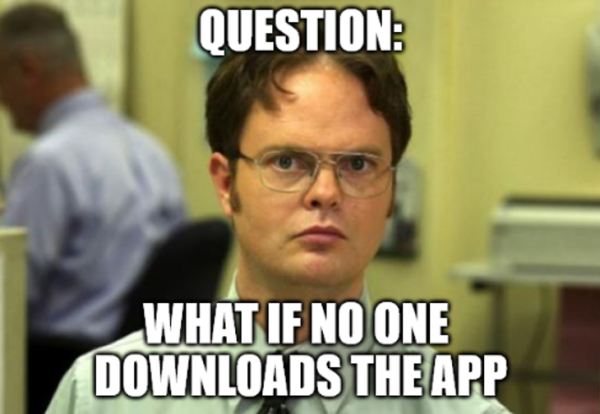
In North Dakota, they tried rolling out their own COVID-19 tracing app (without blockchain), and only about 4% of state residents have downloaded it. We’ll give North Dakota an A for effort, but a D for teamwork.
We can do better than this. How?
- Working together: We will pull together a broad coalition of states to use the same solution (rather than everybody inventing their own solution);
- Using blockchain: The technology really will protect citizen privacy, avoiding the concerns of being tracked by Big Brother;
- Communicating well: We will have a massive PR and media campaign to simply explain the benefits of FastYes, while explaining the benefits of citizen privacy.
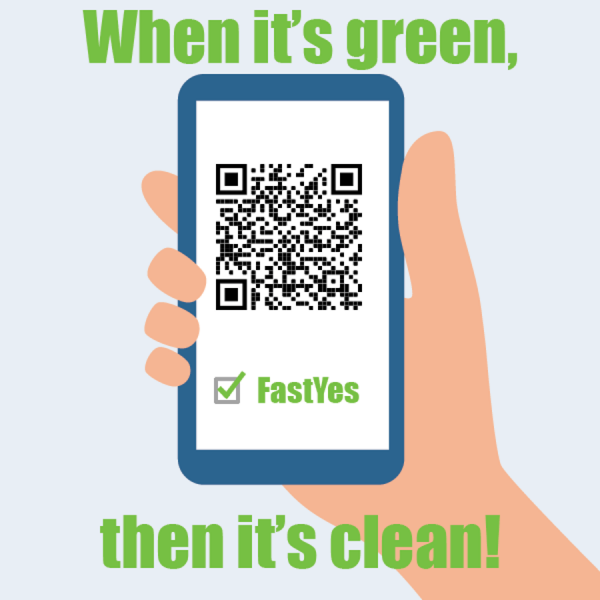
This isn’t just a short-term solution to get us through the next few months; it’s a 100-year solution for the future. Here’s why.
“Laying the Pipes”
In times of great crisis, we often build our greatest infrastructure. We “lay the pipes” for future generations.
The Great Depression led to the Works Progress Administration, which built some of America’s most enduring schools, viaducts, and highways. World War II created new global infrastructure through organizations like the United Nations and the International Monetary Fund. And 9/11 created a new Homeland Security infrastructure, which is an example of how to do it wrong. (More on that below.)
The CoronaCrisis is our opportunity to create a new kind of healthcare infrastructure, and this will have not just short-term benefits to our local economies, but long-term benefits for the months and years ahead. Think of this in three waves:
Basic Testing: For now, all we’ve got is tests that tell us whether you have COVID-19. So for now, critical workers (teachers, daycare workers, medical professionals) will get a weekly test so we can all feel safe. (This is similar to how sex workers are required to get weekly STD tests in places like Nevada.)
Antibody testing: While we do not yet have an antibody test that is 100% accurate, the FastYes platform will be able to track antibody test results, if and when we get a reliable test that shows us who’s already had the virus.
Vaccine: But the main event is the vaccine. We are not out of the woods until we get a vaccine. And once we have reached V-Day, then we need a way of knowing who’s received the vaccine, just like we require immunization records for children on their first day of school.

Blockchain will “lay the pipes” – the critical healthcare infrastructure – for the next 100 years
In short, FastYes is a much-needed upgrade of our entire immunization recordkeeping system to something that is digital, portable, and citizen-owned. (Parents: no more tracking down your children’s immunization records when they switch schools.)
Best of all, FastYes does all this while still maintaining your privacy.
Like TSA Pre, But Without the Big Brother
The experience of going through airport security is pretty terrible.
In the aftermath of 9/11, the United States moved airport security away from third-party contractors to a professionally-trained branch of federal government: the Department of Homeland Security. It might have made things safer, but it definitely made things slower:
- Take off your shoes.
- Take off your belt.
- Take all the metal out of your clothes.
- Put your laptop in a separate bin.
- Drink all your water.
- Throw out all your liquids.
Even then, you could be pulled aside for a manual check. Or a random inspection. Or they might hand search your luggage, because the X-ray scanners might nervously flag anything from a Bluetooth speaker to peanut butter.
And they did this for Every. Single. Passenger.
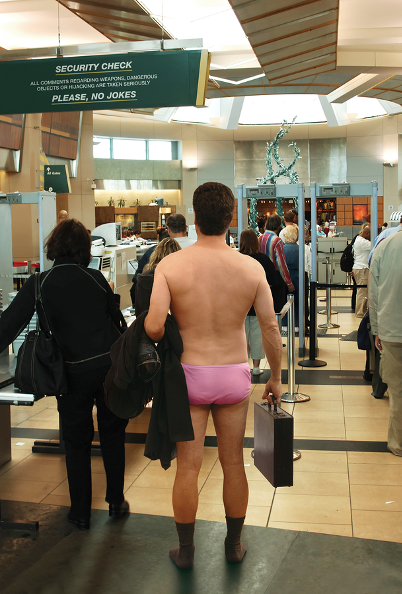
The fastest way to get through airport security.
Frequent travelers made use of TSA PreCheck™, which is the government’s equivalent of Disney’s FastPass+. Compared to the usual airport experience, it was a dream: you didn’t have to take off your clothes, you went through a regular metal detector, and the lines were generally shorter.
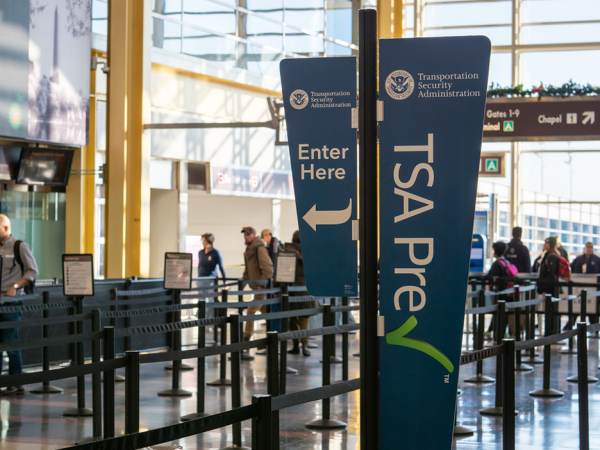
The tradeoff between privacy and convenience.
Here’s the problem: TSA Pre™ requires you to give up your privacy. (They should call it TSA No-Pri.)
To get approved for TSA Pre™, you go to an enrollment center, where they do a background check and take your fingerprints. Fingerprints! You also pay an $85 membership fee (even criminals get fingerprinted for free).
According to the TSA, over 10 million people have gone through this cumbersome, expensive, time-consuming process—all to save a little time at the airport. We can do better than this.
Imagine if we made the FastYes virus tracking process as easy as downloading an app.
Then imagine if we made it free.
It’s Not an Immunity Passport; It’s a “FastYes”
Some people have floated the idea of a COVID-19 “immunity passport,” which is a terrible name. Both words are wrong.
- Immunity: There’s currently no test that can guarantee you have immunity from COVID-19. (Unless you’re dead, but then you don’t need the test.)
- Passport: It’s not a passport. Passports are used by border control or policemen. They’re used to keep people out, or let people in. Bad optics.
Imagine if Walt Disney World had named their “FastPass” technology “MousePort.” Now you’ve got people with MousePort who are somehow better than people without MousePort. Instead of featuring the benefits (faster wait times), you’re creating divisions: those with the passport, and those without.
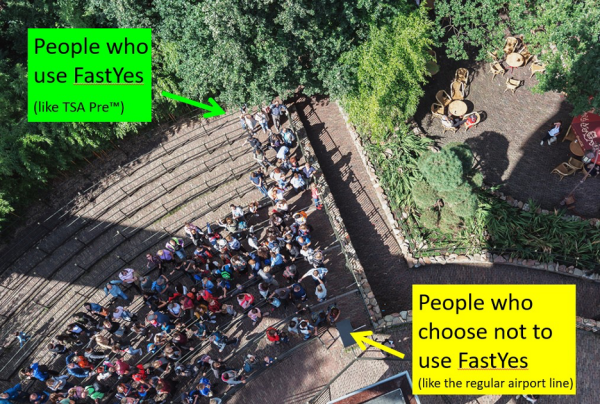
Faster wait times, shorter lines, and no checking your temperature at the door.
Remember: businesses and customers can still operate without FastYes, just like you can go to Walt Disney World and wait in the normal line with everyone else. But if you want the faster experience, to get more out of your day, you get the FastPass.
Same with FastYes: it’s not only safer, it’s faster. It’s not just about peace of mind; it’s about convenience.
Most importantly, it’s about privacy.
This is Not Big Brother; It’s Little Sister
You’re not being tracked. You’re being checked. Big difference.
If you don’t want to be checked, you don’t have to be checked. Go to a gym that doesn’t use FastYes, where you can breathe in the aspirated droplets from all the sweaty, panting customers you like.
FastYes is 100% opt-in – for both businesses and their customers.
You want to go to a nail salon without FastYes, and gossip with your manicurist, so close that you can smell her breath? Great! Maybe your nail salon can find enough customers who are willing to take that risk and stay in business.
Again: FastYes does not track your personal information. Only you and your healthcare provider have the record. All that’s being checked is that your two files match. That’s way better than TSA Pre™, because it protects your privacy and your security.
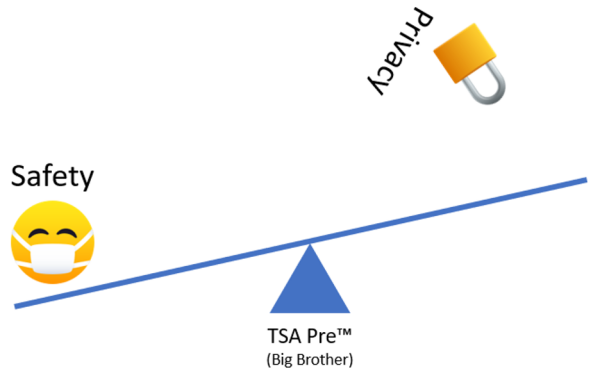
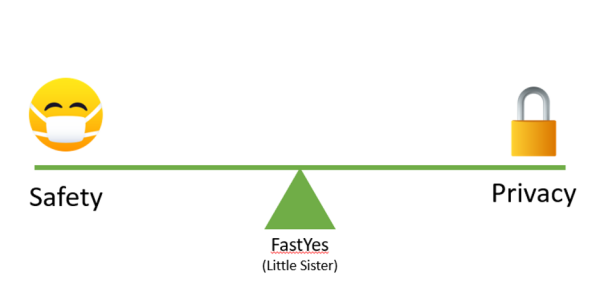
You will still have to scan your phone to get into businesses and schools that require it. Some people won’t like that. But for the economy to recover to 100% participation, for schools and daycares to reopen with 100% confidence, for churches and shopping malls and gyms to return to 100% occupancy, people have to feel safe.
Beyond the economy, this is just simple human psychology. People have to feel safe.
A government-controlled database like TSA Pre™ is Big Brother. A blockchain-based solution like FastYes is way better. We’ll call it “Little Sister.”
TL;DR (Too Long; Didn’t Read)
- The CoronaCrisis is not over until we get a vaccine (V-Day).
- Until then, the economy will not recover to 100% until 100% of people feel safe to resume daily activities.
- A smartphone-based “immunity passport” can tell us who’s safe, but that’s a terrible name. (There’s currently no test for immunity, and it’s not a passport.)
- To make this idea work – especially in America – we must balance security with privacy. Blockchain technology can offer us both.
- The FastYes model is similar to TSA Pre™, but better. Citizens can choose whether to opt in — but they will, because it’s more convenient.
- Businesses do not have to use FastYes — but they will, because it will make it easier for employees and customers. (More safety = more spending.)
- States would be wise to buy into the same solution. If you try to go it alone, you end up like North Dakota.
- FastYes will help keep the economy afloat until we get to the vaccine. And then it will help us track who has the vaccine.
- Then we can finally begin the #GreatRecovery.
Fill out the info below to download our new ebook, Introducing FastYes: The Blockchain-Based Immunity Passport.
P.S.: Contact us if you can help with this project during this time. (We’re building the network.)
Thanks for downloading! We hope you’ll share it with a friend.